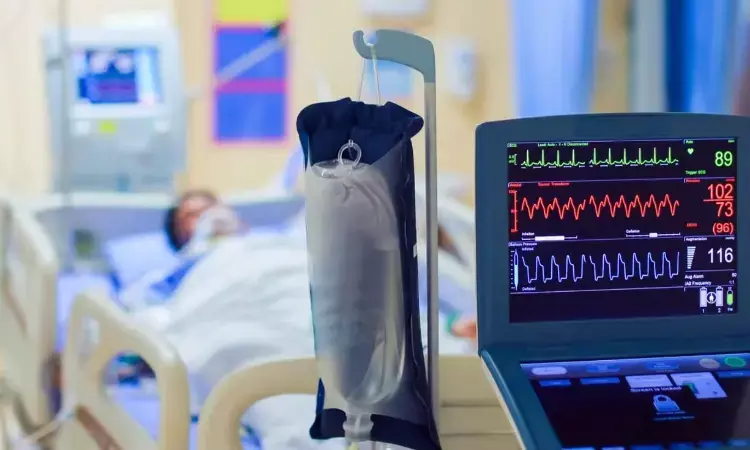- Home
- Medical news & Guidelines
- Anesthesiology
- Cardiology and CTVS
- Critical Care
- Dentistry
- Dermatology
- Diabetes and Endocrinology
- ENT
- Gastroenterology
- Medicine
- Nephrology
- Neurology
- Obstretics-Gynaecology
- Oncology
- Ophthalmology
- Orthopaedics
- Pediatrics-Neonatology
- Psychiatry
- Pulmonology
- Radiology
- Surgery
- Urology
- Laboratory Medicine
- Diet
- Nursing
- Paramedical
- Physiotherapy
- Health news
- Fact Check
- Bone Health Fact Check
- Brain Health Fact Check
- Cancer Related Fact Check
- Child Care Fact Check
- Dental and oral health fact check
- Diabetes and metabolic health fact check
- Diet and Nutrition Fact Check
- Eye and ENT Care Fact Check
- Fitness fact check
- Gut health fact check
- Heart health fact check
- Kidney health fact check
- Medical education fact check
- Men's health fact check
- Respiratory fact check
- Skin and hair care fact check
- Vaccine and Immunization fact check
- Women's health fact check
- AYUSH
- State News
- Andaman and Nicobar Islands
- Andhra Pradesh
- Arunachal Pradesh
- Assam
- Bihar
- Chandigarh
- Chattisgarh
- Dadra and Nagar Haveli
- Daman and Diu
- Delhi
- Goa
- Gujarat
- Haryana
- Himachal Pradesh
- Jammu & Kashmir
- Jharkhand
- Karnataka
- Kerala
- Ladakh
- Lakshadweep
- Madhya Pradesh
- Maharashtra
- Manipur
- Meghalaya
- Mizoram
- Nagaland
- Odisha
- Puducherry
- Punjab
- Rajasthan
- Sikkim
- Tamil Nadu
- Telangana
- Tripura
- Uttar Pradesh
- Uttrakhand
- West Bengal
- Medical Education
- Industry
CGM improves glycemic control in critically ill patients in ICU on intravenous insulin

USA: A new study published in the Journal of Diabetes Science and Technology shows that continuous glucose monitoring improved glycemic control in critically ill COVID-19 patients under IV insulin.
Although it is presently not licensed for inpatients, continuous glucose monitoring (CGM) is used to make insulin dosing decisions in the ambulatory setting. In patients with coronavirus disease 2019 (COVID-19), CGM has the potential to reduce patient-provider interaction, potentially lowering the spread of the virus within the hospital. There is, however, a lack of information about the precision and effectiveness of CGM in titrating insulin dosages in inpatients. In order to relate glycemic outcomes and CGM accuracy to POC measurements, Schafer Boeder and colleagues report on data gathered from 24 people.
CGM (Dexcom G6) was employed in this trial under an emergency usage strategy in conjunction with common point-of-care (POC) glucose readings in patients who were severely unwell with COVID-19 problems and required intravenous (IV) insulin. Retrospective evaluation of glycemic control during IV insulin treatment compared periods with and without concomitant CGM usage. Clarke Error Grid analysis was done to compare CGM glucose levels with POC data, and accuracy metrics were calculated.
The key findings of this study were as follows:
1. 24 severely sick patients who satisfied the requirements for using a CGM in an emergency had readings of 47 333 CGM and 5677 POC glucose.
2. Individuals' glycemic control increased when CGM was utilized during IV insulin treatment (mean difference -30.7 mg/dL).
3. A high degree of concordance was found among 2194 matched CGM: POC glucose pairs, with a mean absolute relative change of 14.8% and 99.5% of CGM: POC pairings lying in Zones A and B of the Clarke Error Grid.
In conclusion, the remarkable agreement between POC and continuous glucose monitoring glucose values during IV insulin administration in critically sick patients suggests that CGM might replace POC measures in inpatients, minimizing patient-provider interaction and infection transmission.
Reference:
Boeder, S., Kobayashi, E., Ramesh, G., Serences, B., Kulasa, K., & Majithia, A. R. (2022). Accuracy and Glycemic Efficacy of Continuous Glucose Monitors in Critically Ill COVID-19 Patients: A Retrospective Study. In Journal of Diabetes Science and Technology (p. 193229682211138). SAGE Publications. https://doi.org/10.1177/19322968221113865
Neuroscience Masters graduate
Jacinthlyn Sylvia, a Neuroscience Master's graduate from Chennai has worked extensively in deciphering the neurobiology of cognition and motor control in aging. She also has spread-out exposure to Neurosurgery from her Bachelor’s. She is currently involved in active Neuro-Oncology research. She is an upcoming neuroscientist with a fiery passion for writing. Her news cover at Medical Dialogues feature recent discoveries and updates from the healthcare and biomedical research fields. She can be reached at editorial@medicaldialogues.in
Dr Kamal Kant Kohli-MBBS, DTCD- a chest specialist with more than 30 years of practice and a flair for writing clinical articles, Dr Kamal Kant Kohli joined Medical Dialogues as a Chief Editor of Medical News. Besides writing articles, as an editor, he proofreads and verifies all the medical content published on Medical Dialogues including those coming from journals, studies,medical conferences,guidelines etc. Email: drkohli@medicaldialogues.in. Contact no. 011-43720751


